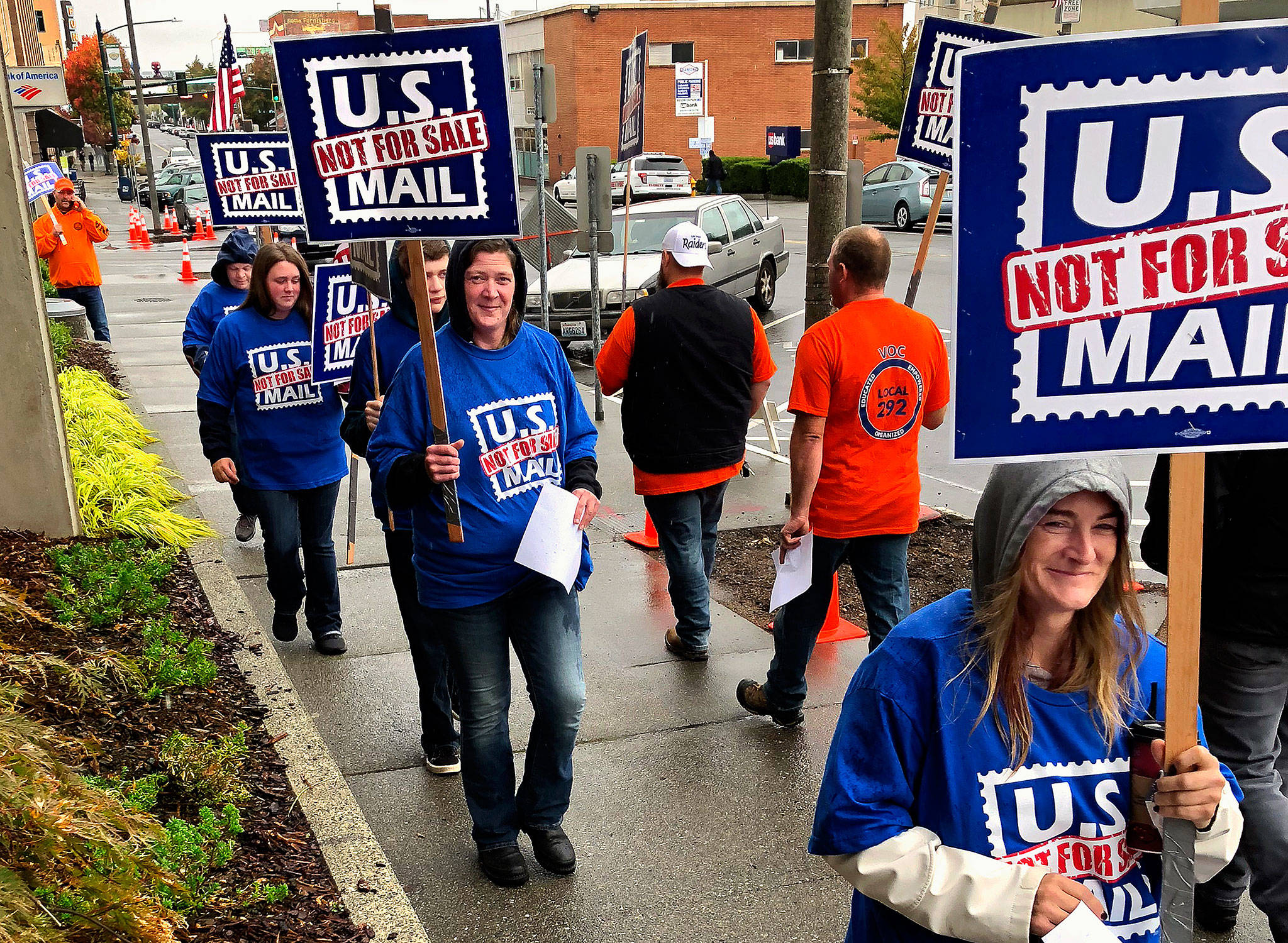For almost 28 years, Kurt Eckrem has delivered what lots of people call snail mail.
In a time when even email sometimes isn’t answered fast enough, when efficiency means a text message, the U.S. Postal Service is being challenged.
Eckrem, a rural carrier with a route on the Tulalip Indian Reservation, didn’t deliver letters or packages Monday, the federal Columbus Day holiday. Instead, he rallied with other postal workers and supporters carrying “U.S. Mail Not For Sale” signs in downtown Everett.
Their informational picket, outside the Wall Street Building, was one of more than 100 around the country. Postal workers were protesting the White House’s Office of Management and Budget proposal to privatize the agency.
“If you know anything about the background of the post office, it is a public service. It was never designed to make a profit,” said Eckrem, 63, president of the Washington Rural Letter Carriers’ Association. The union is one of four representing postal workers.
“It’s a universal service. We deliver to every mailbox in the country,” Eckrem said. “None of the other companies do that.”
Bob James, who also rallied Monday, heads the National Association of Letter Carriers in Snohomish County.
“The USPS is in the Constitution,” James said. “What differentiates the Postal Service, it’s not so much looking at the profit as much as we are trying to do our best to serve the American public.”
In April, President Donald Trump signed an executive order creating a task force to study the Postal Service, saying it was on “an unsustainable financial path.” The task force, which hasn’t yet released recommendations, is expected to endorse privatization, according to The Washington Post and other news reports.
“The goal of the rallies is to get the public to contact their legislators,” Eckrem said. “We need to get the public interested in the issue.”
In Congress, House Resolution 993 was introduced in July. It expresses that Congress “should take all appropriate measures to ensure that the United States Postal Services remains an independent establishment of the Federal Government and is not subject to privatization.” There’s a companion, S. Res. 633, in the U.S. Senate.
As a rural carrier, Eckrem believes privatization would mean much higher prices for some.
“In my opinion, there would be rather significant price hikes in the rural areas. There’s a good possibility people would have to pay to get mail delivered in rural areas,” Eckrem said. “They’d be going after profitable parts in the cities. The outlying areas are not profitable.”
While the notion of snail mail has credence, considering online bill-paying and other ways technology has made a paper letter a thing of the past, people also use the Postal Service in new ways.
“The volume of first-class mail is very much declining,” Eckrem said. “The volume of advertising mail is steady. But packages — it’s amazing. With the internet, it’s crazy the things we deliver.”
Eckrem said the Postal Service is now delivering about 70 percent of Amazon packages. “They’re trying to get their own delivery service,” he added.
And a “last-mile” agreement has the Postal Service delivering some packages for UPS and FedEx, Eckrem said. “We drop off what’s not profitable for them,” he said.
There are other considerations.
“Vote by mail, how would that be impacted?” Eckrem said. “The easier it is to vote, people are going to vote.”
And for convenience, people use the mail for delivery of prescription medications, dog food, diapers — all sorts of needs. “People don’t realize it,” James said.
Eckrem expects to retire soon, and isn’t worried about any change affecting him. James, who carried mail in south Snohomish County, is already retired, but still holds his union position until January.
They worry about current and future workers.
“We’ve got a lot of young people, a lot of single mothers, a lot of veterans,” Eckrem said. “The pro-privatization argument blames unions. It is a good job, a good middle-class job — what we all aspire to. And the unions have, through negotiated contracts, accomplished that for workers.”
Under privatization, he believes, “it will not be a good middle-class job.”
“We need the politicians to listen to their constituents,” Eckrem said. “If enough say we don’t want this, then we’ve accomplished something.”
He also thinks anyone claiming postal workers haven’t adapted to change aren’t paying attention to online shopping.
“If you had told me that at age 60-something I’d be delivering toilet paper for a living, I’d wonder what kind of life I had,” he quipped.
Julie Muhlstein: 425-339-3460; jmuhlstein@heraldnetcom.
Talk to us
> Give us your news tips.
> Send us a letter to the editor.
> More Herald contact information.

























